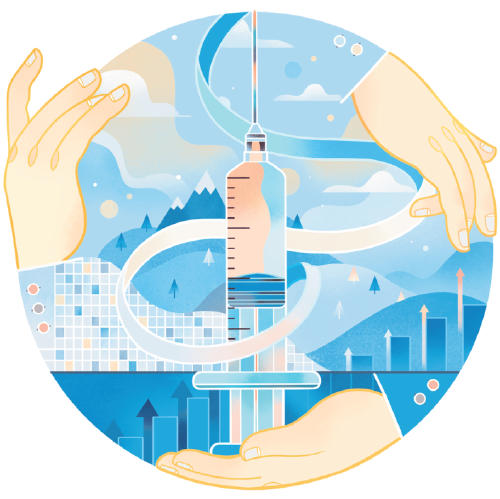Make or break


Sustainable economic recovery requires recommitment to multilateralism and sustainable development
The outbreak of the novel coronavirus has brought irreversible changes to our world. The global health and socioeconomic crises that it has caused have given us a deeper insight into the fragility of our existence. However, it is in such difficult times that people respond with resilience and determination. We can and we must use the circumstances forced upon us by the pandemic as a generational opportunity to build a more sustainable society.
According to the World Health Organization, more than 3 million people worldwide have died from COVID-19 and more than 140 million confirmed cases have been recorded. Additionally, the International Labour Organization estimates that the crisis resulted in an unprecedented loss of 8.8 percent of global working hours in 2020. This is equivalent to 255 million full-time jobs. Women, youth and workers in the informal economy have been hit particularly hard.
Indeed, the pandemic has exposed the shortcomings of our societies. More than ever, we know that early investment in sustainable development-which encompasses the interlinked issues of health, eradication of poverty, employment and education-leads to better outcomes. The need for robust multilateralism, forward progress on the 2030 Agenda for Sustainable Development and implementation of its 17 Sustainable Development Goals, has never been more clear and urgent.
Last year marked the 75th anniversary of the United Nations. The organization has worked tirelessly to promote and maintain peace worldwide since the end of World War II, and this anniversary is another reminder that multilateralism is essential. As UN Secretary-General Antonio Guterres noted, 2021 is a make-or-break year. We need to work together for a better future for ourselves and our planet.
As part of this effort, and as mandated by the UN General Assembly, the secretary-general will put forward his recommendations to advance Our Common Agenda this September. His report will be a steppingstone toward a multilateral system that better addresses current and future challenges. Three priority areas demand immediate global attention.
First, we need a rapid and equitable distribution of vaccines-both for people's health and their economic security. The UN projects that the global economy will rebound in 2021, growing by 4.7 percent. But this can be realized only if infection rates start declining from the first quarter of this year. That means we need a growing share of the global population to receive vaccinations. A global immunity gap puts everyone at risk.
Furthermore, new variants of the virus are spreading quickly. If many more people become infected in major developing and developed economies during the first half of 2021, governments will be required to reintroduce lockdown measures. This will have the effect of lowering the growth rate of the global economy to only 2.8 percent.
Thus, we need a global vaccination campaign to deal with the global pandemic. This requires greater investment in COVAX, whose mission is to buy coronavirus vaccines in bulk on behalf of poorer nations that can't compete with wealthy countries in securing contracts with the major drug companies, and the ACT-Accelerator, the global collaboration to accelerate the development, production, and equitable access to COVID-19 tests, treatments and vaccines, and making vaccine licenses more widely available.
Second, we need urgent financial support for individuals and for all countries that need it if we are to deliver an inclusive economic recovery. In the wake of the pandemic, countries across the world have introduced recovery measures, amounting to about 10 percent of world GDP.
But the relief provided is far from enough.
High unemployment and loss of income have pushed millions into destitution during the pandemic. The total number of people living in extreme poverty is estimated to have increased by 131 million in 2020 alone. This is putting the Sustainable Development Goal of eradicating poverty in danger of being missed by a large margin.
There is one bright spot, however, and that is the economic performance of the East and South Asia region, which has performed remarkably well in controlling the spread of the pandemic and shown great economic resilience. As a result, the region experienced a less severe economic contraction of only 0.5 percent in 2020.
The third area where action is needed is the global climate crisis. The recovery from the pandemic must embrace renewable energy and green infrastructure. This is in line with the UN objective to build a global coalition for carbon neutrality by 2050.
China, in particular, has a big role to play. The country has already shown its commitment to sustainable development, recently marking the successful eradication of extreme poverty. In addition, China will have the opportunity this year to be a world leader on climate action and environmental issues, as it is hosting global conferences on sustainable transportation and biodiversity. The second UN Sustainable Transport Conference that is due to be held in Beijing will help us rethink the ways people and goods move around the world, and how the industry can help promote the global economic recovery and reduce carbon emissions.
The UN Biodiversity Conference, that is to be held in Kunming, will result in a post-2020 Global Biodiversity Framework. This will focus on ensuring that global work to preserve biodiversity contributes to nutrition, food security and livelihoods for all, particularly the most vulnerable.
Other upcoming international meetings on sustainable energy, the ocean and climate change will seek to raise ambition for the Sustainable Development Goals across the board.
All in all, the COVID-19 crisis is a stark reminder that our challenges can only be addressed through global partnerships and strong multilateral frameworks. The global community must deliver vaccines, limit protectionist and nationalist measures, and restore confidence in the multilateral trading systems.
The author is United Nations under-secretary-general for Economic and Social Affairs. The author contributed this article to China Watch, a think tank powered by China Daily.
The views do not necessarily reflect those of China Daily.


































